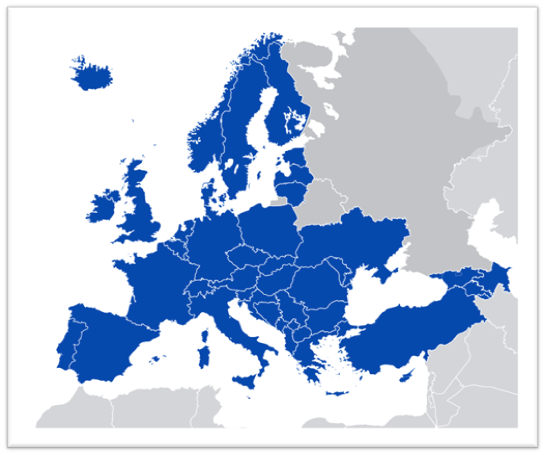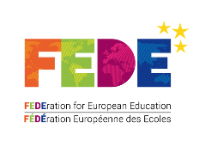The European Political Community (EPC) was founded in Prague on 6 October 2022 during an inaugural summit bringing together 44 European heads of state and government. The summit was organised under the Czech Presidency of the Council of the European Union (EU). The EPC aims to improve unity, cooperation and dialogue between all countries in Europe.
Background
Following the invasion of Ukraine by the Russian Federation on 24 February 2022, the European Union was faced with a complex situation. Indeed, although Ukraine is a democracy, it is far from meeting EU standards, and it would take many years, or even decades, for the country to be admitted as an EU member. The founding of the EPC was suggested to the European Parliament by Emmanuel Macron on 9 May 2022 during the closing ceremony of the Conference on the Future of Europe. The project was officially discussed during the European Council meetings of 23 to 24 June 2022. EU leaders held a strategic debate on the EU’s relations with its partners in Europe as a whole and ultimately agreed to establish the EPC.
The EPC cannot replace the EU’s existing policies and instruments – in particular expansion. But it does aim to provide a policy coordination platform for European countries that have close relations with the EU. The chief aim is to favour political dialogue and cooperation so as to find solutions to shared issues. While it does enjoy the support of Germany, the UK and the European Commission, the project has provoked initial reticence among Central, Nordic and Baltic European countries.
The 44 countries of the European Political Community

Overview of the European Political Community (EPC)
The European Political Community (EPC) is an informal platform for intergovernmental cooperation. It was set up in the aftermath of the invasion of Ukraine by the Russian Federation and is, so to speak, a forum to foster political dialogue and cooperation so as to strengthen the security, stability and prosperity of the European continent. The Community also aims to assist candidates for EU membership (Ukraine, Albania, Bosnia-Herzegovina, Kosovo, Montenegro, North Macedonia, Serbia, Moldova, and others). The Community also aims to bring greater stability to the EU’s external European borders and to re-cultivate relations with countries such as Turkey, the UK and certain states in the Caucasus. The EPC will favour synergies and help to develop concrete cooperation projects in a number of mutually important areas: the protection of critical infrastructure (health, food, transportation, energy and financial services), the fight against cyberattacks and disinformation, energy resilience, cooperation on migration issues, coordination of work on major regional issues, and support for rebuilding Ukraine.
As it is a platform for dialogue and has no formal membership procedure, the EPC will simply invite participants to attend its meetings. It currently brings together 44 heads of state and government: the EU’s Member States plus 17 other countries. Only two European countries have not been invited: Russia and its ally Belarus, owing to the war in Ukraine. Four European micro-states are also absent: Monaco, Andorra, San Marino and the Vatican. Finally, the Council of Europe (CoE), a political organisation that also groups together the majority of European countries (46), was not invited to the first EPC summit, whereas the European Commission and the Council of the EU did attend. There is currently no clear explanation for the absence of the CoE. However, it might be noted that the CoE and the EPC do not have the same goals. The CoE chiefly aims to promote democracy and protect human rights and the rule of law in Europe, whereas the EPC has a greater variety of objectives, as stated above (protection of infrastructure, cooperation on migratory issues, energy resilience, and so on).
The EPC does not furnish an alternative to EU membership but it does aim to provide candidates with policy support during the inevitably long road to EU membership. EPC participation should help participant states to get to know one another and gradually grow closer together. Given the currently tense geopolitical context, a key aim in founding the EPC was to foster a united group of European countries with shared values and a common future.
An inaugural summit focusing on peace, security, climate and energy
The first meeting of the EPC took place on 6 October 2022 at the Prague Castle under the Czech Presidency of the Council of the EU (July to December 2022). The inaugural summit sent out a clear message of unity in a context dominated by the Russian-Ukrainian conflict: the heads of state and government in attendance reaffirmed their unfailing support for Ukraine and discussed the need to build a new space for political dialogue and cooperation in Europe. Four roundtables were organised, each focusing on one of two main topics: peace and security, on the one hand, and, on the other hand, climate, energy and the economy. The summit aimed to improve coordination of foreign policy and security in Europe; to develop stronger partnerships in the fields of energy, transport, trade, research and education; and to bring together civil society and young people across nearly all European countries. Finally, the summit was also an opportunity for European leaders to discuss certain subjects of disagreement and conflict. For example, the President of Azerbaijan Ilham Aliev and the Armenian Prime Minister Nikol Pachinian agreed to the sending, in upcoming months, of an EU civil mission to the territory that has been disputed by their countries for over 30 years. The mission will hopefully reduce tension and help to de-escalate the conflict. Likewise, the leaders of Serbia and Kosovo discussed recent tensions between their countries, while the leaders of Greece, Turkey and Cyprus discussed the conflict that has split Cyprus into two parts since 1974.

Upcoming dates
The summits of the European Political Community (EPC) will be held twice a year so as to ensure regular high-level discussion and effective follow-up for EPC initiatives. The dates are as follows:
- Autumn 2022: Prague, Czech Republic
- Spring 2023: Chisinau, Moldova
- Autumn 2023: Spain
- Spring 2024: United Kingdom
Rémi Loison
FEDE Institutional Relations Policy Officer
